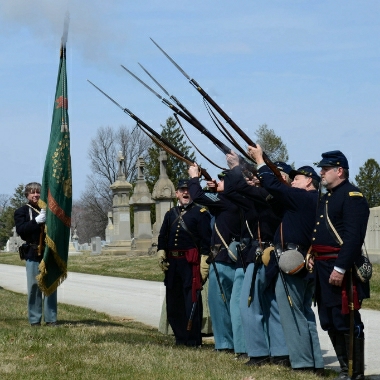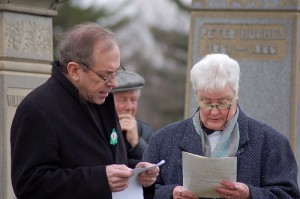To the sounds of bagpipes, several dozen people, many members of the AOH, Clan na Gael and Irish Northern Aid, marched through Holy Cross Cemetery in Yeadon on Sunday afternoon to remember a fight that, to them at least, has never ended.
Every year, the 1916 Easter Rising in Dublin, which marked the stop-and-start beginning of the Irish Republic, comes alive again, and mingles with the memories of the 10 young hunger strikers in Maze Prison (Long Kesh) who died in 1981 when Prime Minister Margaret Thatcher, who, ironically, died just this week, refused their demand that they be accorded special status as paramilitary prisoners.
At the grave of Philadelphia-based Irish republican financier Joseph McGarrity, Sean Conlon, a Sinn Fein councillor from County Monaghan who lived for 14 years in Delaware County, read from the Proclamation of Independence. The document, calling for the British to return Ireland to the Irish, was originally read outside Dublin’s General Post Office by Irish leader Padraig Pearse. Earlier, at the gravesite of “Dynamite” Luke Dillon, an Irish immigrant from Philadelphia who waged a literally explosive campaign in London in an effort to bring the war for independence to British doorsteps, Conlon referred to “the unfinished business of 1916,” a reference to the divided Ireland that continues nearly 100 years later.
Though the violence is largely gone and Ireland “some would say has been normalized,” said Conlon, the struggle won’t be over until “we end the partition and achieve a united Ireland, a new Republic based on the principles of the proclamation read in 1916.”
See our photo essay of the event.


